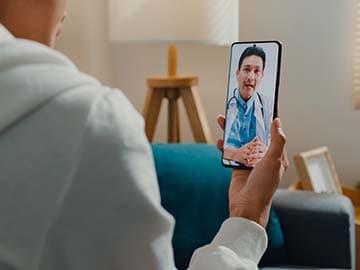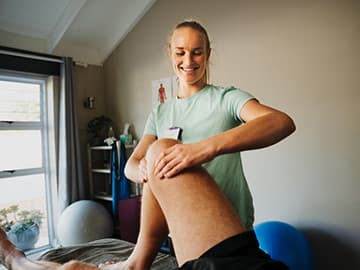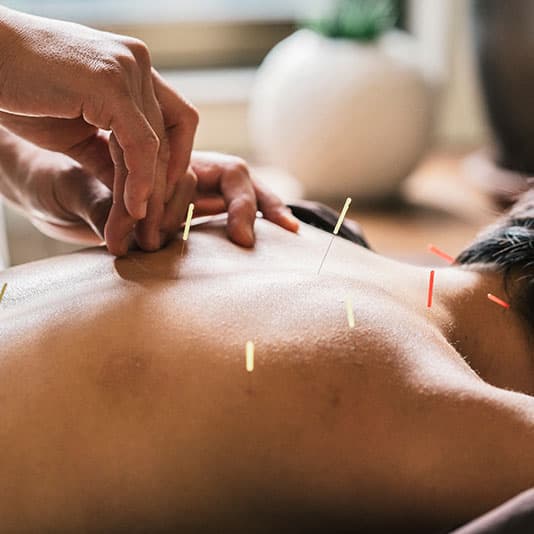A guide to acupuncture

Published on 21/9/2021 by Ian Appleyard (British Acupuncture Council)
Reviewed on 15/9/2023 by Bryony Rhodes-Wort
Acupuncture as a treatment is an intriguing proposition. Whether you're considering treatment, have an appointment booked and looking for information, or are just generally curious about acupuncture, read on. Our answers have been provided by Ian Appleyard from the British Acupuncture Council, and we cover questions like the uses of acupuncture, how it works, and what happens during an appointment.
What is acupuncture?
On a basic level, acupuncture is a treatment originally developed in China that involves inserting needles at specific points on the body to relieve a range of conditions and symptoms. But as Ian Appleyard explains, there's a lot more to it than that...
Acupuncture in Chinese is zhenjiu (针灸). The first character, ‘zhen’ means needle, and the second character, ‘jiu’ means moxibustion. Moxibustion is the burning of a herb called moxa (Mugwort, Artemisia vulgaris) to warm specific parts of the body, including acupuncture points. Therefore, for British Acupuncture Council members trained in the traditional theory, acupuncture involves needles and moxa.
Many practitioners also use techniques using tools for suction and massage such as cupping, gua sha, and tuina massage. They can also make dietary recommendations or suggest specific exercises such as tai ji quan and qigong as part of the treatment plan.
The uses of acupuncture
Acupuncture can be used as a treatment option for:
Chronic pain
Chronic tension-type headaches
Migraines
Prostatitis symptoms
Acupuncture is also commonly used for symptoms such as:
Joint and muscle pain
Jaw pain
Pain caused by cancer
Side effects of chemotherapy e.g. sickness
Before booking an appointment, it's always worth discussing treatment options with your GP to ensure no underlying issues need reviewing.
What's the difference between western medical acupuncture and traditional acupuncture?
How does acupuncture work?
In traditional theory, we think in terms of qi. Qi is an integral part of Chinese philosophy and Chinese medicine. The theory describes how a qi flows around the body along meridians. It is believed that illnesses are caused by excess or deficiency of qi in a different area, by qi moving in the wrong direction e.g. acid reflux, or becoming stagnant e.g. pain. Acupuncture seeks to re-establish a healthy flow of qi.
In terms of modern science, the mechanisms are not yet fully understood. Most famously, acupuncture stimulates endorphins, and this is thought to be part of the explanation for acupuncture's pain-relieving properties.
What happens during acupuncture?
When you arrive for your acupuncture appointment, make sure you're hydrated, not hungry, and relaxed. Easier said than done if the reason you're getting acupuncture is to relieve tension!
During your session, your acupuncturist will ask a lot of questions. You'll be asked about the presenting condition (like period pains or insomnia), sleep patterns, energy, and digestion. You'll also have your pulse taken and your tongue checked.
The reason for this thorough investigation is to get the complete picture, a greater understanding of your lifestyle. All the answers are combined into the final product: a Chinese medication diagnosis called a 'pattern differentiation'.
This 'pattern differentiation' will be your treatment plan and it evolves as your symptoms change. It's a complicated process, but one that's refined to you as an individual because no one is the same.
Once your plan is ready, your course of acupuncture can begin. Typically, a session will last for 30 minutes to an hour, allowing time for the assessment of your health and symptoms, followed by the insertion of needles.
Acupuncture sessions will involve you lying down, and you may be asked to remove some clothes or roll your clothing up so that the practitioner can access parts of your body easily.
The needles used in acupuncture are very fine, you may feel a slight tingle or pressure when they are inserted. Acupuncture is not painful and certain areas of the body will be used based on your condition and symptoms.
Acupuncture should always be a pleasant experience.
Claim back your acupuncture costs
Our 1-2-3 Health Plan provides cover that’s ready to use whenever you need it, from £23 a month.
How many acupuncture sessions do you need?
Every patient is different, and therefore every treatment plan is different.
Your acupuncture treatment plan will probably last a minimum of 3 to 4 sessions and could be ongoing if it fits your lifestyle. One-off appointments are rare, and you may not see instant results.
If you take period pains as an example, it's recommended to go through three cycles with four appointments per cycle, so you'll have 12 treatments.
But as mentioned, it's down to how you're feeling, and how you're responding to acupuncture.
Some people opt for an initial block of treatments and follow it up with monthly and bi-monthly appointments. Eventually, they get to a stage where they're periodically 'topping up' the treatment.
In other cases, having a short course of acupuncture can give you the freedom to move, which gets you up and about and helps alleviate the problem even more.
One thing to remember, acupuncture is not a ten-year guarantee. And it's not a quick and instant fix. Combine it with lifestyle change rather than as a standalone.
Is my acupuncturist qualified?
There is no statutory regulation of acupuncturists in England. However, they may be required to register with their local authority. Acupuncturists can be recognised medical practitioners such as nurses, doctors, physiotherapists or members of a recognised national acupuncture organisation.
The NHS recommend that you check to see if the acupuncturist is a regulated healthcare professional, such as those stated above.
The British Acupuncture Council holds an Accredited Register of practitioners, which has been approved by the Professional Standards Authority (PSA).
Meet the author
Ian Appleyard is the Research and Policy Manager at the British Acupuncture Council. He has a BSc in Acupuncture from Westminster University and a post-graduate diploma from Jiangsu Provincial Hospital of TCM, China.
Ian was the course director for Acupuncture at London South Bank University from 2008-2018. His PhD Acupuncture and moxibustion for osteoarthritis of the knee: a component analysis approach, was completed in 2018.
Related articles and guides

Your guide to the online GP
Everything you need to know about having a doctor's appointment through video call.
Health treatment guides
Learn about other treatments and services that can support your health and wellbeing, like physiotherapy, online GP services, and podiatry.

Your guide to physiotherapy
Why would you need a physiotherapy appointment? And what happens whilst you're there? We have the answers.
This material may contain links to other websites operated by third parties. It is the responsibility of third parties to ensure such material and websites comply with all relevant laws and regulations. To the maximum extent permissible by law Simplyhealth disclaims all responsibility for such websites.
